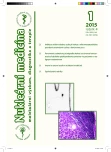Indication of the axillary lymph node dissection in micrometastatic lymph node involvement of breast cancer
Authors:
Milan Šimánek 1; Václav Abrahám 2; Josef Hruška 3
Authors‘ workplace:
Oddělení nukleární medicíny
1; Onkologické oddělení
2; Chirurgické oddělení Nemocnice Pelhřimov p. o., ČR
3
Published in:
NuklMed 2015;4:4-7
Category:
Original Article
Overview
Introduction:
Axillary lymph node dissection (ALND) is clearly recommended only for 3 or more positive sentinel lymph nodes today. It is not indicated for a negative sentinel lymph nodes and presence of only isolated tumor cells. The benefit of ALND is further investigated in patients with less than 3 positive sentinel nodes and/or with micrometastatic involment only.
Aim:
To assess the indication of the ALND when the micrometastatic involvement of sentinel node of breast cancer is detected.
Methods:
Biopsy of sentinel lymph nodes with periareolar application of radiopharmaceutical Sentiscint. 265 patients, 82 of them with positive sentinel lymph nodes, 17 with micrometastatic involvement only, 4 with the combination of micrometastatic and macrometastatic involvement in two different sentinel lymph nodes. The ALND was performed in 7 patients with only micrometastatic involvement and in all 4 patients with a combination of micrometastatic and macrometastatic sentinel lymph node involvement. Patients were then monitored for 41 months in average.
Results:
At least two sentinel lymph nodes were removed in all patients. Only negative lymph nodes were found in axilla after ALND in 7 patients with isolated micrometastatic involvement of SLN and at least one other negative node. No axillary recurrence has been detected during the follow-up period in the remaining 10 patients. Metastatic axillary lymph nodes were found after ALND at half of the patients with a combination of micrometastatic and macrometastatic involvement of various SLN.
Conclusion:
It is not possible to predict the axillary lymph node status when only one sentinel lymph node with the micrometastatic involvement is removed and to stop ALND. But if we find at least one other negative lymph node next to isolated micrometastatic involvement of SLN, the risk of axillary lymph node metastases is small and we do not have to indicate ALND.
Key words:
breast cancer, sentinel lymph nodes, micrometastases
Sources
1. Lyman GH, Giuliano AE, Somerfield MR et al. American Society of Clinical Oncology guideline recommendations for sentinel lymph node biopsy in early-stage breast cancer. J Clin Oncol 2005;23 : 7703-7720
2. National Comprehensive Cancer Network (NCCN) guidelines [online]. [cit. 2014-10-10]. Dostupné na www.nccn.org
3. Krag DN, Anderson SJ, Julian TB et al. Sentinel-lymph-node resection compared with conventional axillary-lymph-node dissection in clinically node-negative patients with breast cancer: overall survival findings from the NSABP B-32 randomised phase 3 trial. Lancet Oncol 2010;11 : 927-933
4. Carlson GW, Wood WC. Management of axillary lymph node metastasis in breast cancer: making progress. JAMA 2011;305 : 606-607
5. Weaver DL, Ashikaga T, Krag DN et al. Effect of occult metastases on survival in node-negative breast cancer. N Engl J Med 2011;364 : 412-421
6. Lyman GH, Temin S, Edge SB et al. Sentinel lymph node biopsy for patients with early-stage breast cancer: American Society of Clinical Oncology clinical practice guideline update. J Clin Oncol 2014;32 : 1365-1383
7. Cronin-Fenton DP, Ries LA, Clegg LX et al. Rising incidence rates of breast carcinoma with micrometastatic lymph node involvement. J Natl Cancer Inst 2007;99 : 1044–1049
8. Weaver DL. Pathology evaluation of sentinel lymph nodes in breast cancer: protocol recommendations and rationale. Mod Pathol 2010;23 Suppl 2:S26-32
9. Reed J, Rosman M, Verbanac KM et al. Prognostic implications of isolated tumor cells and micrometastases in sentinel nodes of patients with invasive breast cancer: 10-year analysis of patients enrolled in the prospective East Carolina University/Anne Arundel Medical Center Sentinel Node Multicenter Study. J Am Coll Surg 2009;208 : 333-340
Labels
Nuclear medicine Radiodiagnostics RadiotherapyArticle was published in
Nuclear Medicine

2015 Issue 1
-
All articles in this issue
- Role of sentinel node in breast cancer
- Indication of the axillary lymph node dissection in micrometastatic lymph node involvement of breast cancer
- Comparison of whole body bone scintigraphy with levels of the serum concentration of human epididymal protein 4 in patients with malignant melanoma
- Internal and external clinical audit in nuclear medicine
- What can you see on the image?
- Nuclear Medicine
- Journal archive
- Current issue
- About the journal
Most read in this issue
- Indication of the axillary lymph node dissection in micrometastatic lymph node involvement of breast cancer
- Role of sentinel node in breast cancer
- Internal and external clinical audit in nuclear medicine
- Comparison of whole body bone scintigraphy with levels of the serum concentration of human epididymal protein 4 in patients with malignant melanoma
